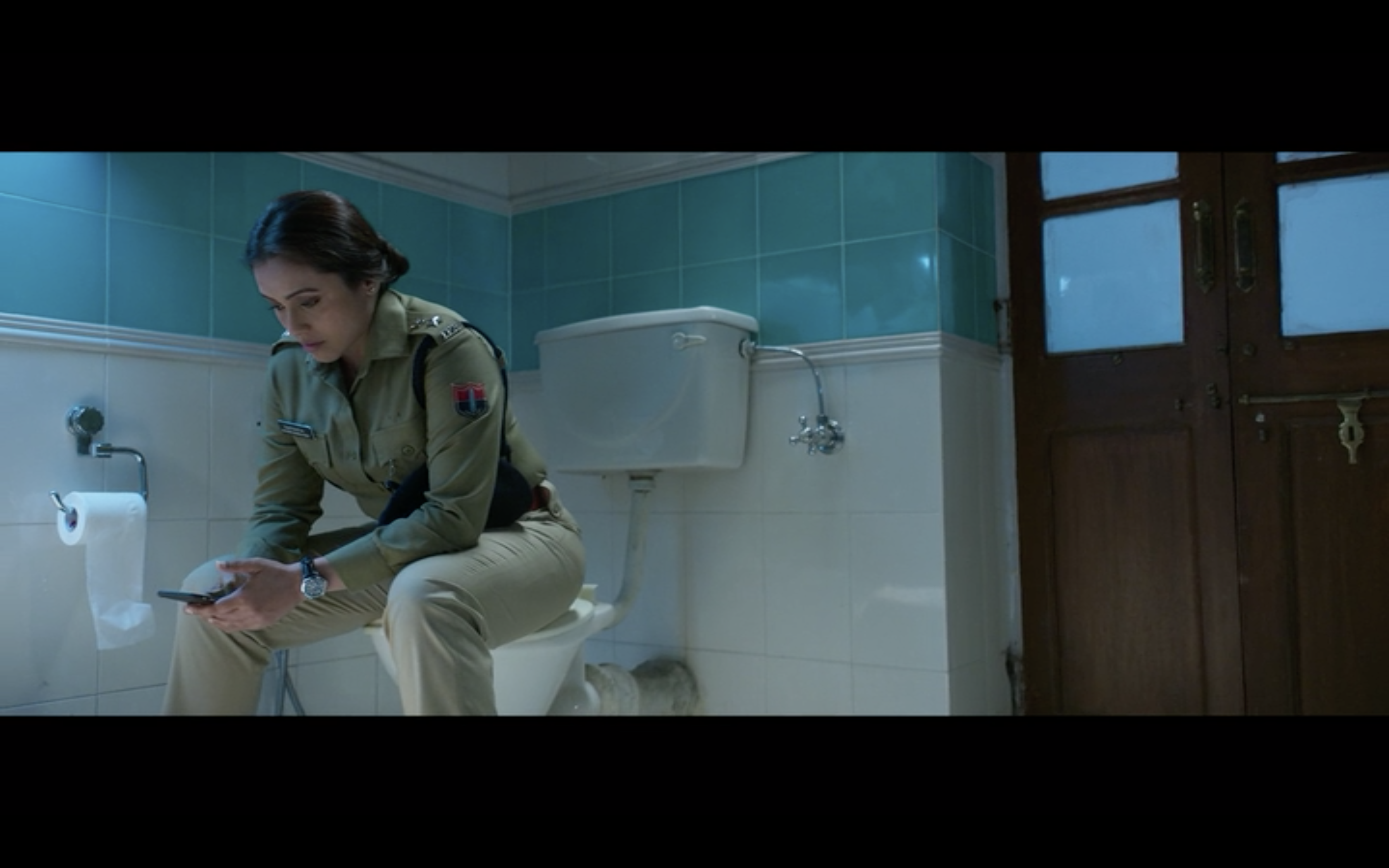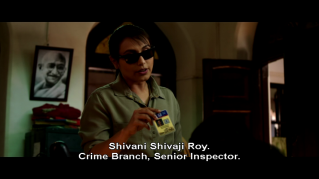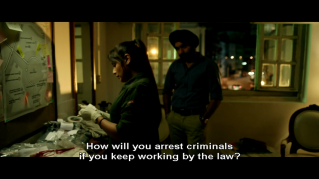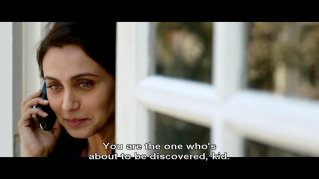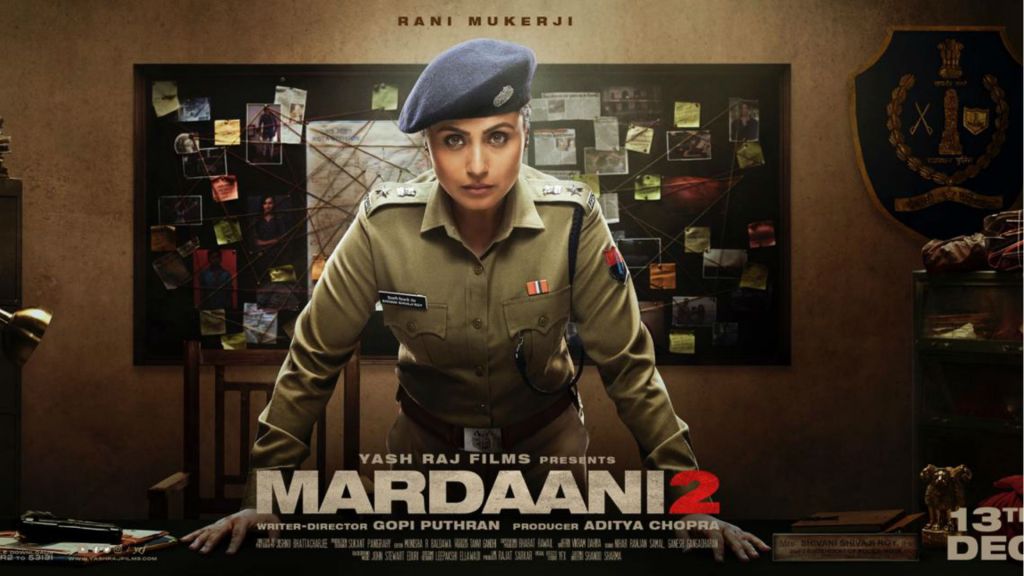
With the cinemas closed here in Australia, it seems a good time to catch up on some films I missed last year. Mardaani 2 only had a short, limited run in Melbourne, which is a shame because this is a good solid crime thriller that plays to its strengths. Once again Rani Mukerji is excellent as the tough cop who won’t let prejudice stand in her way but Vishal Jethwa is just as good as her adversary. With only a few missteps, and a face-paced and relentless storyline, Mardaani 2 steps up to the mark as a satisfying sequel to the first film.
Mardaani 2 pits SP Shivani Shivaji Roy (Rani Mukerji) against a serial rapist who’s also an assassin for hire and a complete psychopath to boot. At the start of the story, Sunny (Vishal Jethwa) has been hired by local politician Panditji (Prasanna Ketkar) to eliminate rivals to his preferred candidate for upcoming elections. But as well as being an efficient hitman, Sunny is a particularly nasty rapist who tortures and murders his victims before staging their bodies to be found by the police. The character seems an extreme amalgam of misogyny, violence and psychosis, but his reasons for targeting his victims are chillingly realistic.
Sunny has a problem with strong confident women whom he sees as a threat, which basically says all we need to know about his own mental health issues. Vishal Jethwa swings between terrifying normal and completely insane in the same way that you imagine most rapists are able to present a normal face to society and hide the monster within. The only disappointing feature is that Sunny frequently breaks the fourth wall to speak to the audience. It feels off and doesn’t provide any further insights into his character by using this method to reveal his thoughts. Writer/director Gopi Puthran could just as easily have made the character talk to himself, or confide in his victims which would have made more a more reaslitic scenario. Too, some of the ways in which Sunny is able to evade the police and snatch his victims seem unlikely. Sunny involves himself closely in the investigation too, some of which is well done, but there are other elements, such as his attack on a young witness, that seem rather far-fetched and filmi. Still, for the most part, the character is written to capture the terrifying reality of some men’s attitudes towards women and does get across the message that this is in no way acceptable in to-days society.
As in Mardaani, Rani Mukerji’s police officer is cool, calm and frighteningly competent. There are none of the ego-stroking flights of fancy that tend to accompany male actors in these roles and Shivani isn’t portrayed as a superwoman. She has issues and problems, mostly created by the misogyny around her, but she works through these by being competent in her job. There is friction with one of her senior officers, Shekhawat (Sumit Nijhawan) which is realistic and adds another layer of tension to the action. The media also play a part, and one of the most memorable scenes occurs when Sivani appears on a talk show to refute suggestions that her gender makes her less suitable for her job. It’s a powerful performance that is a little undermined by the host’s silent acceptance of her speech (I’ve seen Indian talk shows, and everyone seems to yell over each other with no respect for anything other than their own opinion!), but the emotion generated is sincere and inspiring. What also works well are the small touches of humanity that Shivani displays. She treats her team like real people, and has a moment of quiet contemplation in the bathroom, while a quick conversation with her niece online reminds us that she has a life and a family outside of the investigation. Through it all Rani puts in a powerful performance that fills the screen with her presence, and ensures that the drama is completely captivating throughout.
The subject matter is one that occurs frequently in India cinema, but here there is no sensationalism and Gopi Puthran treats the victims reasonably sensitively. I don’t think it’s necessary to show images of victims, but at least here the focus is on the violence that the women had to endure and serves to accentuate the brutality of the murders. John Stewart Eduri’s background music also fits well into the film and serves to enhance the suspense and action. I also liked the location of the film, and really appreciated being able to see somewhere other than Delhi, Mumbai or a generic regional area. The film is set in Kota, Rajasthan, and I enjoyed the glimpses of the city and colourful Rajasthani costumes that serve as a backdrop to the action. It’s peripheral to the story, but did make the film feel fresh and interesting to be in a more novel location.
Mardaani 2 has more focus on male privilege and the plight of women compared to the first film, but it’s perhaps even more relevant to-day. The misogyny is also simply part of the story, part of what Shivani has to face and deal with every day, which ensures that the film doesn’t ever feel preachy or antagonistic towards men. It’s just the day to day reality of Shivani’s job, and part of society. The inclusion of rape statistics at the end is horrifying, but perhaps, like the film itself, will raise more awareness of the massive problem India, and indeed the world, has with such crimes. But despite all of this, Mardaani 2 isn’t just a film trying to educate the audience about crimes against women. At heart it’s a thriller, and there are all the usual elements; car chases, dramatic escapes, police raids on silent darkened buildings and thrashing of suspects. It’s well-paced with plenty of suspense and surprisingly violent for a Hindi film. I really enjoyed Mardaani 2 and I hope this becomes a franchise with a few more outings for SP Shivani Shivaji Roy, although I would like to see her tackle a different type of crime if we do get another sequel. Worth watching for Rani, Vishal Jethwa and the exciting storyline. 4 stars.













